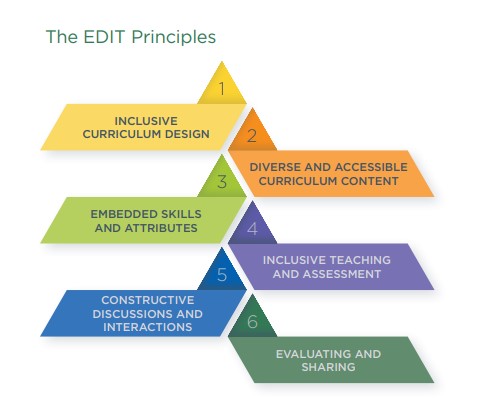Terminology changes and usage can be highly individualised. It is also important to be mindful of trends in language as a staff member or student may associate with a term perceived by some, even members of the same community, to be inappropriate. Athena Swan Ireland has developed an EDI Literacy Glossary to support understanding of inclusive approaches to equality work and it can be accessed here: Athena Swan Ireland EDI .Glossary

Designed to be used by academic and professional staff who are planning and teaching programmes and modules, the EDIT principles relate to stages of curriculum design and delivery, to better enable their implementation. The first principle relates to the aims and intended outcomes of the curriculum, as an invitation at proposal or review stage
to reflect on why it is being designed and who it is being designed for.
Principles two and three concern the ‘what’ of curriculum development, the subject knowledge and perspectives that are taught, as well as the skills and attributes which students develop. Principles four and five relate to the ‘how’ of teaching, learning and assessment, and the interactions that occur in classrooms and related processes such as evaluation, partnership,
student voice, etc. Finally, principle six closes the loop with a focus on accountability and dissemination for ongoing improvement.
In the EDIT Charter we commit to:
01
Ensuring that the aims of curriculum design regarding intended
learning outcomes and graduate attributes do not rest on stereotypes
and assumptions about students, graduates, the disciplinary
community, and future employment fields, which act as barriers to
participation.
02
Ensuring that curriculum content is inclusive and that students see
themselves reflected in it, diversifying the range of content and
perspectives included.
03
Embedding and facilitating the skills and attributes within the curriculum
that are required of graduates to participate in a diverse and evolving
society, study and working environments.
04
Providing an inclusive and accessible range of modes and methods
of teaching and assessment to ensure that students can learn and
demonstrate the learning outcomes successfully and authentically
(following UDL principles).
05
Promoting constructive discussions and interactions that are respectful
and where possible reflective of a range of equality groups within the
curriculum and about the curriculum. These may be between staff and
students, external contributors and students, and amongst students.
06
Evaluating the impact of our curriculum on the student experience and
sharing practice among other signatories of this Charter.
The EDIT toolkit is intended to represent these principles within the everyday
activities of curriculum design, development, and engagement with learners.
